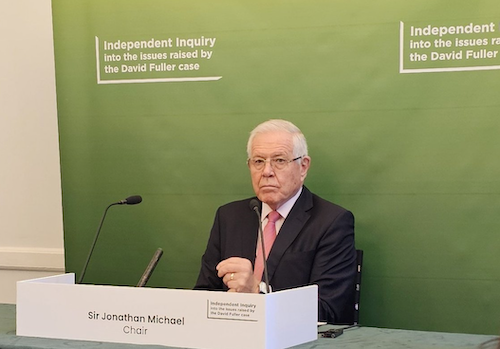The Independent Inquiry into the issues raised by the David Fuller case has published its Phase 1 Report.
In November 2021, the Secretary of State for Health and Social Care announced an independent inquiry into the issues raised by the actions of David Fuller, an electrical maintenance supervisor.
Over the course of 15 years, Fuller committed sexual offences against at least 100 deceased women and girls in the mortuaries of the Kent and Sussex Hospital and the Tunbridge Wells Hospital. His victims ranged in age from nine to 100.
 This phase of the Inquiry has been to establish what happened in the Maidstone and Tunbridge Wells NHS Trust to allow Fuller to commit such awful crimes and to understand how his offending remained undetected for so long. The Inquiry held interviews with over 200 witnesses and reviewed more than 3,700 documents.
This phase of the Inquiry has been to establish what happened in the Maidstone and Tunbridge Wells NHS Trust to allow Fuller to commit such awful crimes and to understand how his offending remained undetected for so long. The Inquiry held interviews with over 200 witnesses and reviewed more than 3,700 documents.
Based on the evidence heard and reviewed by the Inquiry team, the report makes 17 recommendations with the aim of preventing any similar atrocities happening again in the Trust, including:
• the Trust must ensure that non-mortuary staff and contractors are always accompanied by another staff member when they visit the mortuary. Maintenance staff should undertake tasks in the mortuary in pairs [Recommendation 1];
• the Trust must assure itself that all regulatory requirements and standards relating to the mortuary are met and that the practice of leaving deceased people out of mortuary fridges overnight, or while maintenance is undertaken, does not happen [Recommendation 2];
• the Trust must review its policies to ensure that only those with appropriate and legitimate access can enter the mortuary [Recommendation 6];
• CCTV cameras must be installed in the mortuary and the post mortem room. The footage must be reviewed regularly, alongside records of who is accessing the mortuary and how often [Recommendations 9 and 10]; and
• the Trust Board must review its governance structures to make sure that the Board has greater oversight and assurance of legally regulated activity in the mortuary. The Trust must treat the deceased with the same due regard to dignity and safeguarding as it does its other patients [Recommendations 13, 14 and 17].
Sir Jonathan Michael, Chair of the Inquiry, said: “When I was asked to chair this Independent Inquiry, I was conscious of the responsibility of the role, as Fuller’s crimes had caused shock and horror across our country and beyond.
“As a former NHS hospital consultant and Chief Executive, I hoped that I could help provide answers to the families of Fuller’s victims by identifying what went wrong to allow the creation of an environment, where Fuller was able to offend undetected for so long. I also wanted to help the Trust, and all organisations charged with the oversight of the Trust and its mortuary services, to understand, to acknowledge and learn from what went wrong and to take steps to ensure that nothing similar could ever happen again.
The offences that Fuller committed were truly shocking, and he will never be released from prison
“The offences that Fuller committed were truly shocking, and he will never be released from prison. Failures of management, of governance, of regulation, failure to follow standard policies and procedures, together with a persistent lack of curiosity, all contributed to the creation of the environment in which he was able to offend, and to do so for 15 years without ever being suspected or caught.
“Over the years, there were missed opportunities to question Fuller’s working practices. He routinely worked beyond his contracted hours, undertaking tasks in the mortuary that were not necessary, or which should not have been carried out by someone with his chronic back problems. This was never properly questioned.
“There was little regard given to who was accessing the mortuary. Fuller entered the mortuary 444 times in a single year, and this went unnoticed and unchecked.
“Mortuary staff were mostly unsupervised and left to their own devices. They frequently did not follow policies and standard operating procedures. Deceased people were left out of fridges in the post-mortem room both overnight, and during working hours when Fuller was carrying out maintenance tasks. He was not accompanied or supervised by mortuary staff at these times.
Mortuary staff were mostly unsupervised and left to their own devices
“On their intermittent assessments, those responsible for regulation of the mortuary often did not detect these systemic procedural failings.
“It was in this uncontrolled environment that Fuller was able to offend undetected. The senior management of the Trust were aware of problems in the running of the mortuary from as early as 2008. But there is little evidence that effective action was taken to remedy these or that the Trust Board paid any attention to the mortuary. Requests for CCTV to be installed in the mortuary were not actioned for over a decade.
“Had his colleagues, managers and senior leaders been more curious, it is likely that he would have had less opportunity to offend.
“In identifying such serious failings, it’s clear to me that there is the question of who should be held responsible. Although the failures took place over many years and during various management and regulatory regimes, I expect the current leadership of the Maidstone and Tunbridge Wells NHS Trust and those outside the Trust charged with oversight and regulation, to reflect seriously and carefully on their responsibility for the weaknesses and failings that I have identified in this Report and to implement my recommendations.
“I am satisfied that our detailed work and the co-operation we received from the Trust and other interested parties has enabled the Inquiry to reach robust and evidence-based conclusions. Had the measures that I am recommending, been in place when Fuller was working at the Trust, I firmly believe his offending could have been prevented.
Had the measures that I am recommending, been in place when Fuller was working at the Trust, I firmly believe his offending could have been prevented
“I note that the Trust has improved its overall performance in recent years. Only this year, it was moved into the highest category in the NHS England performance monitoring system. The findings of this Inquiry are in sharp contrast with that.
“Fuller committed 52 per cent of his offences between the beginning of 2018 and his arrest in December 2020, the same time period during which the Trust has seen rapid improvement in other areas. This serves as a stark reminder that there may be serious hidden issues found in organisations that are apparently performing well.
“The fact that the Trust was apparently improving its overall performance does not in any way excuse the failings that allowed Fuller to offend. The thousands of staff who worked hard to provide high-quality care for patients across the Trust, and had nothing to do with the running, management and oversight of the mortuary, will be justified in feeling let down by their colleagues who held those responsibilities.
“As the Inquiry has been preparing and finalising this Phase 1 Report, we have also begun our Phase 2 work, looking at the broader national picture to understand the procedures and practices across the country which are in place to protect the deceased, not just in hospital mortuaries but in other settings too. Central to this is understanding whether we can be confident that offending such as Fuller’s couldn’t take place in other locations where the bodies of the deceased are kept.
“I would like to reiterate my sincere thanks to the families of Fuller’s victims, for bravely sharing their feelings and experiences with us, and for their patience as we undertook the process of reviewing evidence and drafting this Report.”

